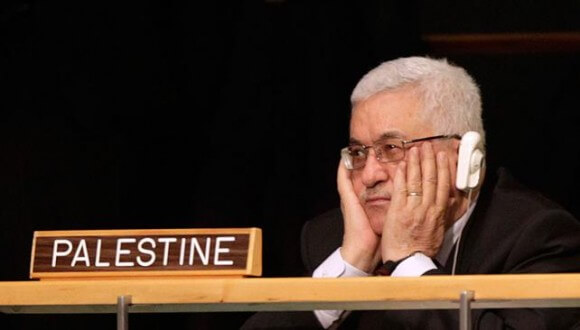
We spend a lot of space on this site following the generational (and intra-family) divide in the Jewish community over Israel. Turns out there seems to be a split among Palestinians as well, but this one focuses on the way forward – one state or two?
Jodi Rudoren has a very interesting piece in today’s New York Times on the debate happening within Palestinian families in the West Bank. And she starts at the top, with Mahmoud Abbas’s own son:
When President Mahmoud Abbas of the Palestinian Authority visited the White House this week, he again heard dire warnings that the current moment could be the last chance for a two-state solution through negotiations with Israel.
Back home in Ramallah, Mr. Abbas’s own son has been telling him that last chance is already long gone, the negotiations futile. The son, Tareq Abbas, a businessman who has long shied away from politics and spotlights, is part of a swelling cadre of prominent Palestinians advocating instead the creation of a single state stretching from the Jordan River to the Mediterranean Sea in which Jews and Arabs would all be citizens with equal rights.
“If you don’t want to give me independence, at least give me civil rights,” Mr. Abbas, 48, said in a rare interview at his well-appointed apartment here as his father headed to Washington. “That’s an easier way, peaceful way. I don’t want to throw anything, I don’t want to hate anybody, I don’t want to shoot anybody. I want to be under the law.”
And Abbas is not the only one. Rudoren also quotes Palestinian pollster Khalil Shikaki who says the numbers for Palestinians 45 years old and younger are skewing towards one state, including his own son:
“Just ask my son,” Mr. Shikaki, 60, wrote in an email. “He will tell you that my generation has failed and should exit the stage and take its mainstream paradigm, the two-state solution, along with it.
“The views of my generation were formed during the heyday of the Palestinian national movement; his views were formed during the failed years of Oslo, the days of perceived Palestinian Authority corruption and tyranny, the Internet and social media,” Mr. Shikaki added, referring to the 1990s Oslo accords, which laid the two-state groundwork. “We are pragmatic; he is idealistic. We demand independence and sovereignty; he demands equal rights.”
Most interesting Shikaki says the backing for one state among Palestinians under 45 is “solid” and that they “cannot be satisfied by a two-state solution.” Seems like it might be equal rights or bust.


This is where right meets left. I’m sure the devil is in the details, but Caroline Glick is in favor of annexing the West Bank and giving the people the vote. (I’m sure she has enough exceptions to prompt a fit from the true hearted egalitarian, but the basis is there.) There is a major divide between Glick’s idea and Abbas’s son’s idea: Gaza. (The attitude towards the refugees as well.) But this is where right meets left and Caroline Glick or the Bayit Yehudi (renegade) MK’s proposals for annexing the West Bank are essentially the same direction as that of Abbas’s son.
>> Back home in Ramallah, Mr. Abbas’s own son has been telling him that last chance is already long gone, the negotiations futile.
The greed and covetousness of Zio-supremacists has known and still knows no bounds.
Mr. Abbas (fils) may very well be correct that a two-state solution is dead but, unfortunately, a one-state solution – which requires prising supremacist “Jewish State” from the “cold, dead hands” (to paraphrase Charles Heston) of Zio-supremacist Jews – seems just as unlikely.
Very important articles and insight, both here and the NYT.
I wonder what Rudoren’s motive was for probing this deeply into what Palestinians think. Her article seemed pretty straight forward and descriptive, but there’s an underlying sense of wistful urgency to it. A dire but subtextual warning (to Jewish-Israelis and supporters here in the US) about what is to come, given within a context that nothing will ever be tried to prevent it?
Kind of an odd tone, imo. But realistic, for a change.
I’d be curious what is meant by “If you don’t want to give me independence, at least give me civil rights”. Civil rights imply citizenship and citizenship is a two way contract where the state (the sovereign) has obligations towards the populous and the populous towards the state. So far in general Palestinians (Israeli Arabs semi excluded) have firmly rejected accepting the obligations towards the state implied by citizenship.
Certainly if there is a willingness to become Israeli then the deep issues disappear and all kinds of options for solution open up.
So I’d be very curious what’s meant in some detail. I suspect it isn’t much more than a slogan. For example Israel is a global leader in agricultural research about low water usage for high crop yield. Would the New Israelis (i.e. the Palestinians post civil rights) freely give up their heavy water consumptive methods of farming and farm instead like Israelis? Or to be darker, the IDF is one of the central institutions of Israeli society. Are the New Israelis ready to go into Lebanon and kill Hezbollah forces on the orders of Israeli generals?
If the answer is yes everything else is easily fixable. But I suspect the answer is no. That is they don’t want to be Israelis they want to a 5th column with voting rights and I can’t see how the state could permit that among millions more voters.
But I’d certainly be interested in hearing what this next generation has to say. The two state paradigm was tired 20 years ago and I think Camp David proved it simply isn’t going to happen.